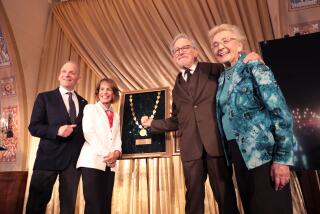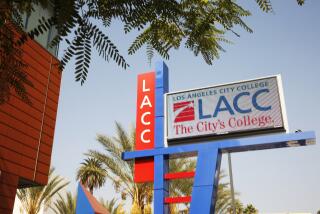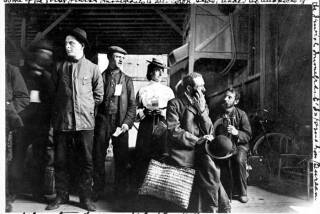Schooled in Heroism
A former security guard, hailed as an international hero last year for his role in exposing how Swiss banks were holding onto Jewish assets from the Holocaust, will spend the next four years studying under a full scholarship at Chapman University.
“He will be a wonderful role model for our students,” Chapman President James Doti said of Christoph Meili. “I’ve been struck by the deep conviction and courage he showed in doing what he did.”
The Swiss citizen, who fled to the United States after receiving threats in his native land, is living in New Jersey. He will begin college in Orange next fall.
“California has a better life quality,” Meili said in a telephone interview Wednesday. “It’s better for the kids, I think the schools are better, and you have the mountains and the sea.”
Meili, 30, was a security guard at the Union Bank of Switzerland in January 1997 when he made a discovery that was to dramatically alter his life. While making his regular rounds one night at the bank’s Zurich headquarters, he noticed two large containers filled with old books about to be shredded.
“I go back and take a better look,” Meili later told a reporter, and “was shocked” to discover that the books contained financial records dating to World War II. Some were the records of Jewish financial assets and properties that had been confiscated by the Nazis during the Holocaust.
The discovery came right after a visit by the president of the World Jewish Congress as part of a two-year campaign to retrieve Jewish assets, which had been plundered by Nazis before and during the war and deposited with Swiss banks. An investigation into the matter had recently heated up. And just three months previously, he said, Switzerland had enacted a law forbidding the destruction of war-era documents pertaining to Holocaust assets.
But Meili had recently seen “Schindler’s List,” the movie about a businessman who saved Jews during the Holocaust. The film had deeply affected him. “I have the feeling I also have to do something,” he later told the reporter.
What he did made him a hero to many in the world, but a villain to some in his own country. Working with Jewish leaders and the Jewish press in Switzerland, Meili told his story to an international audience. Though many of the financial records had already been destroyed, he flew to the United States to testify before the Senate Banking Committee. And, eventually, Meili’s disclosures played a key role in bringing about a $1.25-billion settlement between the Swiss banks and Holocaust survivors.
At first, coverage in the mainstream Swiss press was positive. Then the attacks began, labeling him everything from a self-aggrandizing publicity seeker to an Israeli spy. Meili was fired from his job, shunned by friends and family and targeted by death and kidnapping threats. Finally, about 18 months ago, he fled with his wife and two young children to the United States, where President Clinton granted him permanent resident status.
Until recently, Meili was working as a hotel doorman in Manhattan. Then, last spring, he flew to California to attend a Whittier Law School conference in Costa Mesa, where he gave a speech heard by two people who were to change his life once again.
One of them was William Elperin, a Los Angeles attorney and president of the 1939 Club, an organization of Holocaust survivors and their families. The other was Marilyn Harran, professor of religion and history at Chapman University and teacher of Holocaust studies.
“I was very impressed,” she said, “by his self-effacing account of his actions and by the fact that he’d been influenced by ‘Schindler’s List.’ This is someone who could have just walked by, but, just as Schindler stopped and intervened, Christoph made the same kind of decision.”
After reading a newspaper article in which Meili expressed his desire for a college education, Harran went to university president Doti, suggested a full scholarship and started the ball rolling.
Elperin, meanwhile, was approaching other universities with the same idea. Several major institutions in Southern California responded positively, though he won’t say which ones. In the end, he said, Meili chose Chapman because of its “small size, real concern for him as a human being” and location in an area that is a good place to rear children.
In addition, Elperin said, the campus is very strong in the fields of Meili’s interest, which include cinema, history, law, philosophy and computer science. “We visited the campus with him,” the lawyer said, “and the weather was absolutely perfect. He loved the school, loved the warmth of the people, and so he committed to come out.”
Meili’s scholarship at the university will cover his tuition, about $18,000 a year. In addition, Elperin said, the 1939 Club will support the former security guard and his family for up to five years through contributions from its members and the Jewish community.
“We want him to concentrate on his studies,” he said.
University spokeswoman Ruth Wardwell said that Meili will fit in well at the private university of 3,700 students. “We want to provide Orange County with role models of ethical behavior,” she said. “We are proud of Christoph as a citizen of the world.”
Meili, meanwhile, is preparing for his college education with special lessons in English.
Knowing the outcome, would he do the same thing again?
“It was worth it for me and my family,” Meili says. “We stepped out from a normal life and everything changed. It was really hard at the beginning. Now it’s easier, and this help is great.”
Harran is quick to agree.
“I just feel really good about helping a young man who made a huge choice in his life not knowing what a huge choice it was,” she said. “We’re helping him to realize a dream. If that’s not what education is all about, than I don’t know what is.”
More to Read
Sign up for Essential California
The most important California stories and recommendations in your inbox every morning.
You may occasionally receive promotional content from the Los Angeles Times.










